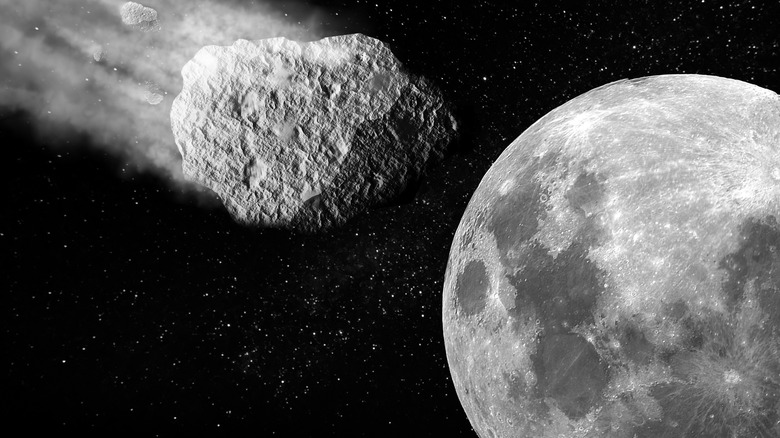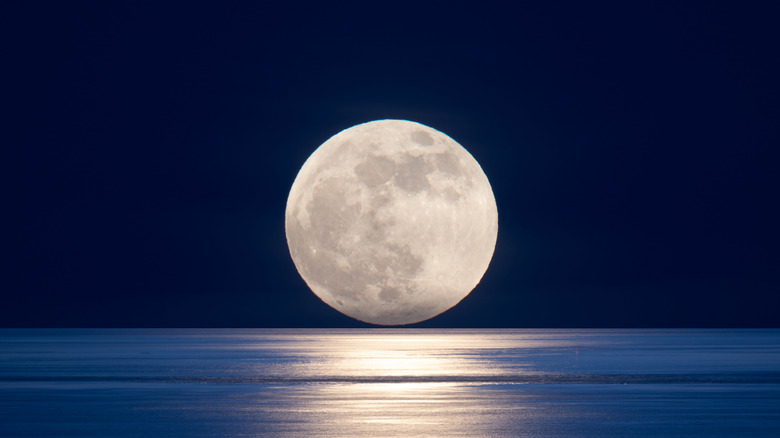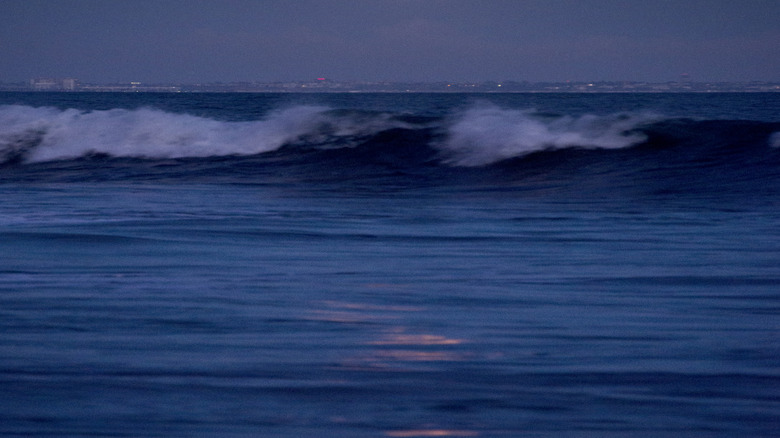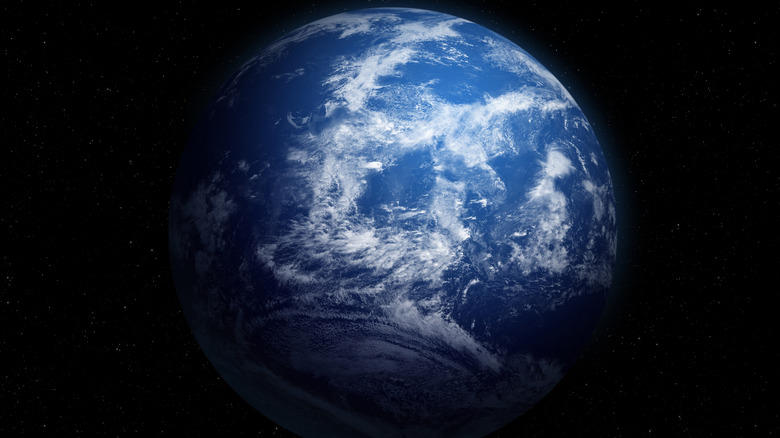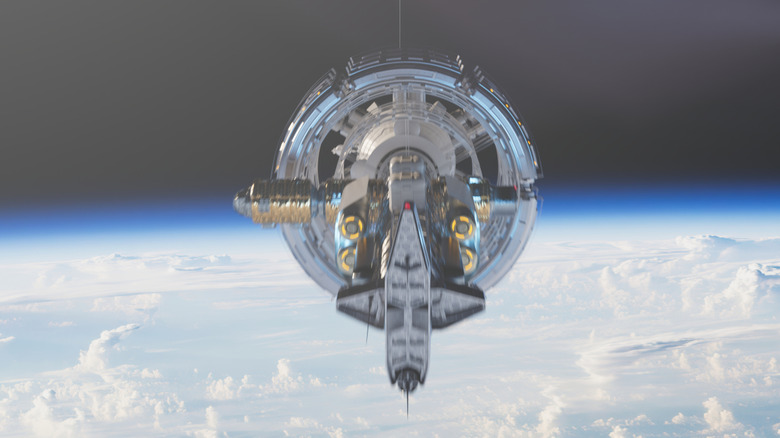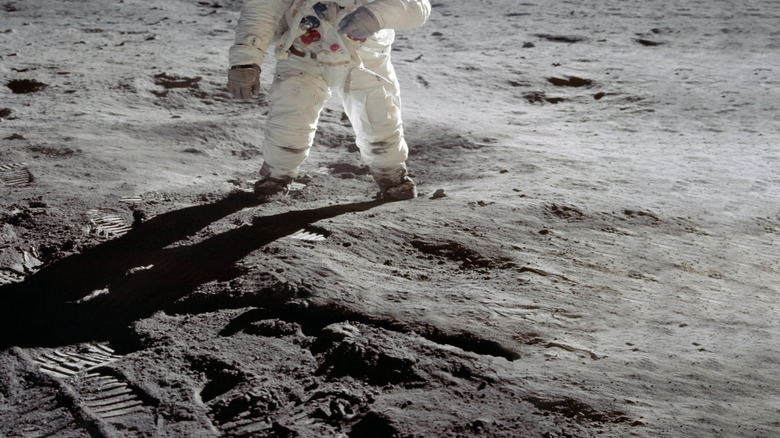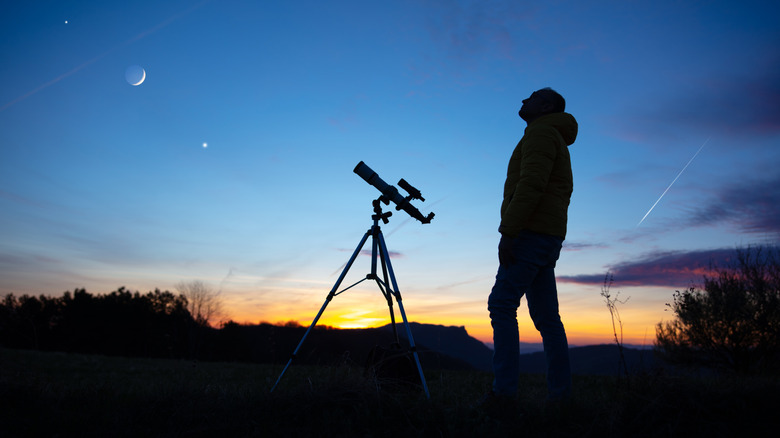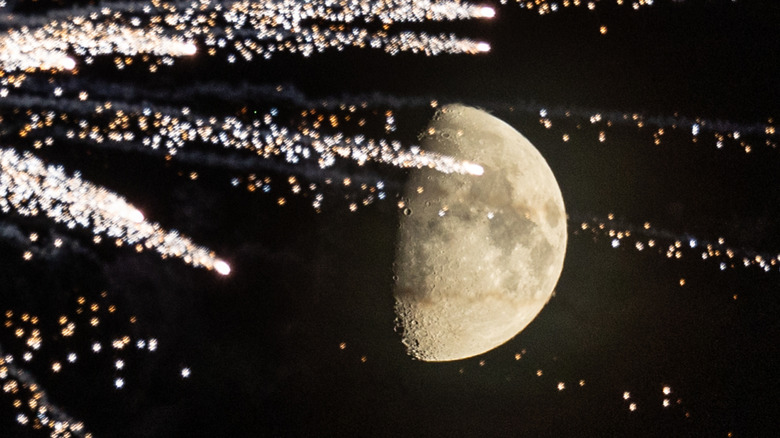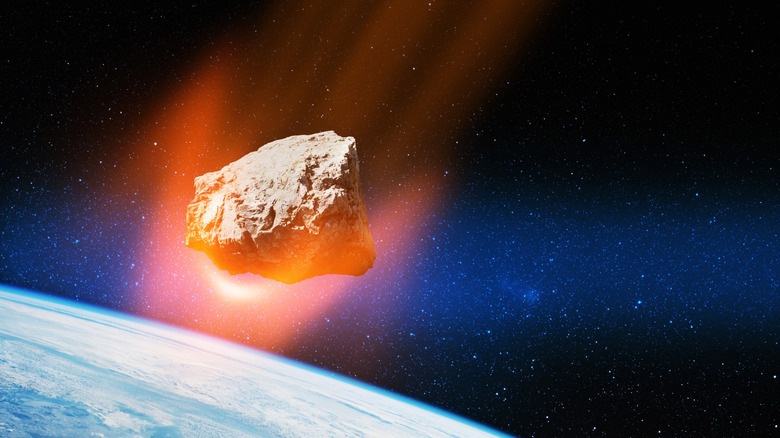What Horrible Things Would Happen To The Earth If There Was No Moon
There are only a handful of things in life that are a sure thing — that can be counted on to appear each and every day. The moon is one of the things on that very short list. Every night (and sometimes while the sun is still out), that big, blotched white orb is going to light up the evening sky. The moon is universal to the human experience, inspiring folklore and religion and even helping to regulate the forces that make life on Earth possible. No matter what phase it's in, the moon is extremely important to our collective existence. Plus, it's a comforting presence that's just pretty to look at.
While it's incredibly unlikely to ever happen, imagine that suddenly, there is no moon. Through some cataclysmic astronomical event or grave error of manmade technology, the moon disappears, blows up, or disintegrates. This is one of those big "what if?" questions that seemingly doesn't have an answer because it's so far-fetched, if not totally frightening. However, scientists have a pretty good idea of what would happen if and when the Earth's biggest and most permanent natural satellite were to ever go away. These are all the ways that the world, and everyone living on it, would change if the moon wasn't hanging around anymore.
The tides would change
The moon and the Earth enjoy something of a symbiotic relationship, with the ocean's tides as the common vehicle. As the planet rotates, it creates a strong centrifugal force. This force works with the pull of gravity from the moon and sun to cause constant and vigorous movement through the ocean, which covers about three-quarters of the surface of the planet.
The moon pulls on the Earth about twice as hard as does the sun because it's so much closer. If it were to disappear, tidal activity would be significantly lessened. Scientists know this because when the moon took shape, it was much closer to the Earth, resulting in bigger tides and waves than what regularly occur now. The more distant the moon, the less effect it has on the seas.
A calmer ocean isn't a good thing — not for surfers, and certainly not for life in, under, and over the ocean. Tides manage the temperature of the ocean, with currents of warmer and colder waters circulating around the world and creating life-sustaining conditions. Those currents also help direct the winds that make coastal areas some of the most temperate-inhabited places on Earth. No moon would mean barely any tides, making the ocean too cold and too hot for life in some spots. Fewer heat-regulating winds also would exacerbate climate change and raise the temperature of the Earth, not just on beaches.
Life in coastal areas would change for the worse
The loss of the moon would be the first step in a causally apocalyptic domino effect. Without the moon forcing tides to do their job, currents wouldn't move much, and they'd be unable to regulate the traffic of undersea life or the temperature of the sea. Without food, so much of the ocean's ecosystem would die off, while a lot more of it would die from sudden or gradual cooling or heating of their part of the sea.
That in turn would create a negative economic and lifestyle impact for anyone who lives or works near an ocean, whether that's on an island or in a coastal area. That's a lot of people, somewhere in the billions, as about 75% of the world's entire population lives within about 30 miles of an ocean. Those individuals use beachside intertidal zones to acquire the food they eat or put into the global seafood economy. Without tides, fishing and seafood sourcing could end or be rendered completely unsustainable. An end to the oceanic food chain would mean a lot less fish for humans to eat and sell, too. Those mass extinctions that would eradicate ocean life would lead to poverty and widespread starvation deaths for humanity, too.
The Earth would move faster
About 4.5 billion years ago, an object called Theia hit the Earth with such violence and at such an odd angle that it broke off enough material that ultimately formed the moon. A day on Earth — defined as how long it takes the planet to rotate on its axis — consisted of about four to five hours. The mutual gravity the Earth and moon put on each other slows down that rotation, and gradually more so over time. Each century, the moon makes the Earth rotate 0.002 seconds slower, which has resulted in a rotation period we've all gotten used to of about 24 hours.
Should the world discover one day that the moon has left its orbit or been destroyed in some way, one of the most immediate effects would be on time itself. Without the mutual gravitation of the moon affecting Earth's spinning speed, the planet would be once more free to move at its original, natural rate. In other words, the Earth would rapidly return to a much speedier pace, approaching its original rotation. No longer would a day last 24 hours, but more like four or five.
Darkness would come for many
The reason that Earth experiences four seasons is because of the moon's location. The Earth tilts at a 23.5-degree angle relative to the sun, and that remains fairly firm and constant thanks to the stabilizing pull exerted by the moon. Over a period of 26,000 years, that angle never changes by more than 2.4 degrees. That leads to only a slight shake, unnoticeable to human beings. But more importantly, it makes every season roughly the same length and occur at the same time of the calendar year every year. Without that moon, all of that stability and consistency from a stable, rotating axis would end.
The Earth would be subject to rolling around as it orbits the sun, without warning and arbitrarily, too. Living things wouldn't necessarily physically feel what astronomers call an unpredictable wobble, but it would change the idea of a four-season year with 24 hours a day. The poles delineating the axis could shift as far as the equator. Some parts of the planet may not experience daylight for long stretches of time, while simultaneously other areas would endure indefinite darkness. Important plants and crops would have a hard time growing in such an environment, while animal life would be tremendously disrupted, too.
Nocturnal animals would be devastated
It's a given that a lack of a moon would create far more (and longer lasting) darkness around the Earth. While this would certainly take some time for humans to get used to, that new situation would prove tremendously difficult for animals. Species that have evolved to do their hunting at night, such as bats and owls, would be disoriented by the new and inconsistent nighttime schedules. Confusion over when it's time to eat, sleep, and mate could affect populations around the world. Not only that, but the prey creatures would gain an advantage over their traditional predators.
In addition to nocturnal animals, numerous creatures have biological cycles that connect to those of the moon. Without the orb's behavior providing instinctual clues, birds that use moonlight to track their migration wouldn't know where to go. Coral spawning in the Great Barrier Reef could also be interrupted or end entirely without the rise of the moon giving sea life its signal to begin.
It would harm scientific research
Through decades of advanced observation from Earth, along with multiple missions to the moon, both manned and unmanned, scientists have learned a lot about the planet's breakaway neighbor and chief satellite. As the nearest space object, it's where any research into the cosmos has and could begin, with scientists using it to study and learn about how things form, move, and interact throughout Earth's orbit, galaxy, and beyond. A loss of the moon would be a huge setback from a research perspective. Scientists have only really just begun to understand the moon, and it may hold the key to technological advancements for the human race or serve as a source of fresh water to a planet beset by environmental disaster.
An absent moon would of course mean nobody could analyze it, but it would also limit scientific research into the history of our planet. By looking at the moon, which was once part of Earth, scientists can gain valuable insight into this planet's history and evolution. Without this guide, we may miss out on crucial knowledge about its past and future.
No moon, no culture of the moon
For as long as humans have inhabited the planet, the moon has been right there with them. As a constant and intimidating but reassuring presence, it took on supernatural status in many ancient cultures. Lunar calendars determined daily routines and inspired rituals as well as some of humanity's earliest expressions, like stories, songs, and artwork.
In caves in Western Europe, researchers have discovered evidence that humans adhered to moon cycles more than 30,000 years ago. Indeed, ancient civilizations like the Celts, Incas, and Mayans left behind documentation that they respected the moon and built time-measuring methods around the body's movements, image, and cycles. "People carefully watched the course of the moon, noting its position over the natural horizon and the change of its phases," historian and astronomer Michael Rappenglück told ScienceNews. Even today, the moon and its lunar phases still factor into religious and spiritual movements across the globe. It's safe to say it would be catastrophic if the central element in cultural and religious rituals were to simply no longer exist.
It would impact future space missions
If the moon were to up and disappear one day, even the most non-violent means would result in a profound and permanent change to life on Earth. It would make the planet hard to live on, all at once or gradually, depending on the threat. And it could be the impetus for the much speculated and science-fiction-inspired concept of humanity's mass exodus away from Earth. In a twist of tragic irony, however, the thing that would ultimately lead to people ditching the Earth would also make that departure much more difficult. If the moon were to join all the other bizarre things floating in space, any new chapters in the history of lunar exploration would be quite impossible without it.
In 2018, the existence of water on the surface of the moon was confirmed. This would suggest that any future expeditions to the natural satellite could be more than just exploratory, as the presence of life-sustaining fresh water means that humans could colonize the moon and live there indefinitely. That dream and ambition obviously wouldn't take place if the moon disappeared. Travel to solid celestial bodies beyond the moon, or where the moon sits, would also become more difficult. Space programs have theorized that the moon could be used as a stopping-off point for astronauts and crafts heading off to visit other planets in the solar system. It would be that much harder for a long-haul space mission without the moon in this scenario.
Hobby and professional astronomers would have a clear night sky
While Earth would be rendered essentially uninhabitable for all life if the moon were to suddenly divorce its natural cosmic partner, there is something of a bright side. Or should we say, a dark side: The possibilities and capabilities of research and amateur astronomy would be greatly enhanced without the moon around to get in the way. As the closest and thus largest and most luminescent object occupying the night sky, the powerful light of the moon renders so many other celestial objects virtually invisible without a high-grade telescope.
There are plenty of distant stars that astronomers and non-astronomers can see from the Earth's surface with or without aid when we have a moon. But without it, we'd see countless more. A moon-free existence could lead to a new golden age of astronomy, with previously unseen stars, galaxies, constellations, and even planets getting noticed and named for the first time. On the other hand, less moonlight would make the sky much darker, so researchers might have to adapt by developing new astronomical tools and strategies.
But could the moon feasibly go away?
It's a scientific reality that currently, the moon is drifting away from Earth. But that's a function of gravity, and it's occurring at such a slow rate that it doesn't threaten to break free anytime soon. Even an asteroid isn't a threat — it would take an extraordinarily large one to jostle the moon out of its strong orbit around Earth, and there's fancy new tech to detect asteroids anyhow. It would take a planet shooting at a tremendous speed from a massively distant location, past where our solar system ends, and running into the moon to break the gravitational pull that connects it to the Earth.
According to astrophysicists, the moon was created more than 4.5 billion years ago when something as big as the planet Mars crashed into the Earth. The collision chunked off such substantial amounts of material that gravity pulled them together into an orb that fell into the planet's gravitational pull. For the moon to be broken up or be freed of its orbit, an event equal to or larger than the circumstances that created the satellite would have to hit it. Wandering, wayward planets aren't that rare — there are as many as 400 the size of Earth alone floating through the Milky Way galaxy. But the chances of one of those finding itself on a direct collision course with the moon are astronomically slim.
Blowing up the moon would destroy Earth as well
Most scientific speculation of a moon-free future hypothesizes that some outer force, like a comet or planet, would be responsible. The effects of spontaneous moon removal on the Earth would be much the same if humans intentionally blew up the moon, along with some other bizarre consequences. The amount of gravitational energy holding the moon and Earth to each other is 120 million-trillion gigajoules. Anything less than that may break up the moon into a few or many pieces, but the gravity is such that they'd eventually regroup into its familiar spherical shape and resume its rotation. For that to not happen, any explosion of the moon would involve digging shafts hundreds of miles into the core of the natural satellite and filling them with around 600 billion high-powered nuclear bombs.
After that monumental mega-explosion, all those moon bits would have to go somewhere, and a lot of them would head for the Earth. That stuff would fall slowly, with the orbit of the planet preventing dangerous speeds, but the sheer amount of debris bits descending from the sky, however small they are, could certainly fatally strike countless people and cause property damage around the globe. The kinetic energy generated by the moon rocks would be a much worse problem. Earth's atmosphere would suck it up upon entry, leading to permanently hotter temperatures that would just keep getting worse until no living thing could sustain it.
